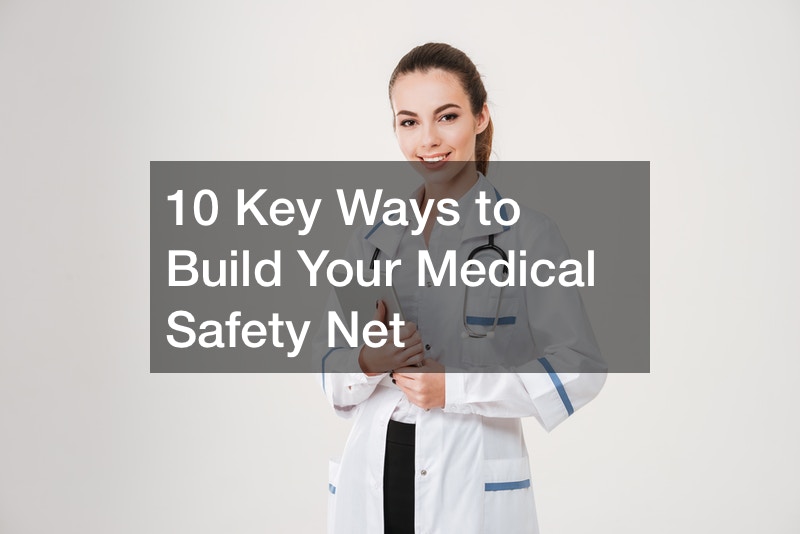
Medical care is essential, but the cost is not affordable for many. It can be challenging to carry on with medical expenses, and it’s easy to find yourself buried in medical bills. Building a health safety net is essential in today’s medical world. A health insurance policy or plan can protect you from the high cost of care from unexpected emergencies and illnesses.
For starters, be sure your health insurance covers at least 24/7 access to a long list of doctors and specialists in case something goes wrong with you or your loved ones during an emergency. It is also crucial to note how much payment you will require if you experience a not-so-good illness or injury.
It is also vital to know how often you will pay for the medical cost for specific medical procedures and services, such as hospitalization, prescription drugs, and doctor’s office visits, among others. It is advisable to get a list of all the benefits that should be covered and think of what you might expect when you are bound to incur costs. Here are ways to build your medical safety net.
1. Learn About Your Employer’s Benefits Offerings
Most employers offer health benefits to their employees, and your workplace benefits are a great place to start building your medical safety net. Be sure to learn about the types of coverage offered through your employer, including any services you aren’t using but may need access to in the future.
Some employers may give employees a monthly cash amount to spend on health care or allow them to use their benefits as a credit toward other expenses. Be sure you understand how these options work, and look into whether there are any money-saving strategies you can employ.
Many employers offer a variety of benefits to their employees. You may not be aware that some employers will provide additional benefits such as group insurance, community health needs assessment, life insurance, dental, and even vision. It pays to ask your employer what the offerings are because there are a lot of hidden gems among them. Learn about your employer’s benefits offering so you can plan and decide what is best for you when building a safety net.

2. Think About Long-Term Care Coverage
You may have the option of purchasing long-term care insurance to help take care of your family if you or a loved one becomes unable to take care of themselves. Discuss this with your doctor and medicare insurance consultant to determine if this is something you should start planning for, especially if it involves long-term care services that you don’t yet need.
If you’re worried about your retirement plans, consider what would happen if you fell ill or needed long-term care. Coverage with a long-term care policy can protect you from some of the more unexpected expenses that often arise in the later years of one’s life.
There are only a few things to consider when constructing your medical safety net.
Life insurance offers protection for a person in the event of death. It is a different type of coverage than long-term care, which typically protects individuals against the need for nursing care and activities of daily living.
A prospective policyholder needs to research what is considered life and how long the term would last if one were to die. The longer the coverage period and the smaller the premium, the better it is to consider this aspect.
Critical illness insurance is part of life insurance plans. This aspect covers significant health events such as heart attacks, stroke, brain injury, and more.
3. Save Money for Emergencies
It is vital to note that an emergency can happen at any time. It’s critical to build up a cash savings account with enough money to pay for any emergency expenses that you may encounter. Your company may offer certain benefits, but they aren’t likely to cover all your costs should you need some out-of-network care. Be sure you have enough money to protect yourself if you end up in a situation like this.
Creating a monetary plan for yourself is one of the best ways to ensure your savings grow. You can start by determining the money you spend on spas every month. You should make a budget and see where your money goes each month. Doing this will give you specific guidelines to follow to build your medical safety net.

4. Look at Short-Term Health Insurance Plans
It’s possible to purchase short-term health insurance policies for periods when a regular medical safety net doesn’t cover you. These policies are an inexpensive way to protect your medical expenses. At the same time, you wait until your next open enrollment period or until you can take advantage of the employer coverage offered to you. Make sure to research any costs involved and decide whether or not to purchase the policy based on your financial abilities.
You’ll not find short-term plans with the same coverage you get from traditional health insurance. But if you need help getting by in a very tight situation like after an accident, it might be just what you need. You can work with medical exemption lawyers to represent you in the legal suit after the accident. A short-term plan will also reassure people waiting for group health insurance through their employer or deciding between two jobs.
A short-term plan is one you buy on your own rather than through an employer or government program. The details vary by the insurance provider, but typically a short-term plan will give you coverage for three to twelve months.
5. Take Stock of Your Medical Prescription Needs
If you have employees at your place of business or if you can’t afford health insurance, you should consider buying a short-term health plan. You can use these plans to cover prescription and integrative medicine that you need while you wait for insurance coverage to become available again. You may also be able to use the flexible spending account offered by your employer, and you can use this fund to cater to any prescription costs you have during this time.
There are many ways to build and maintain a medical safety net of health care. Of course, it’s not always possible or desirable to change everything about your medical practice immediately. When you’re truly tired of being sick, it’s time to take stock of your current situation and see what you can do to boost your health in the future.
When it is time for you to renew your current prescription, you may have difficulty finding a new one without some help. An excellent first step is to get a complete list of all your medications and their side effects. It is even possible to use an Internet service to get this information for free.
First, find out if the list has any dangerous side effects. If there are harmful side effects, discuss this with your doctor. If you don’t get satisfactory results, you may want to consider switching doctors or changing medications. Sometimes just a change in dosage can reduce many common side effects immensely. If you want to get the most out of your treatments, it is also essential to ensure that you take the proper dose. Many people don’t realize that they are taking too little or too much medicine, which can have a less-than-desirable result.

6. Consider the Costs of a Medical Billing Coder Certification
There are lots of jobs that require certification to gain employment. It includes medical billing coders, who code the insurance payments sent by doctors and hospitals to insurance companies with a particular benefits package.
If you have a job in the medical field, you likely have access to insurance that will help pay for health care costs. If you are self-employed or work with a company that doesn’t provide coverage, it can be challenging to stay on top of medical expenses. You may not have the foresight to build a medical safety net. Still, you can connect with a medical billing company to become more knowledgeable about the ins and outs of health care.
Medical billing coding has become a popular career for job seekers. Still, it’s essential to consider the costs involved in obtaining certification, especially considering the time commitment to complete such course work and the cost of tuition.
Costs vary depending on whether or not you’ll be attending a traditional brick-and-mortar school or an accredited online college. You can take a less expensive route by taking classes through an independent healthcare training company.
7. Consider Using Credit Cards to Take Advantage of Medical Discounts
Many employers offer discounts on prescription drugs through their prescription programs for employees. If you participate in these programs, it might make sense to start using your company’s credit card whenever possible. You may be able to save money this way, and it’s an easy way to build your medical safety net.
Banks, credit unions, and credit card issuers regularly run promotions designed to entice people to use their cards to get paid back or earn rewards. That’s great about getting an offer in the mail or calling a company directly to see if they offer a discount for paying with plastic. This option is budget-friendly, and it won’t cost you anything extra.
The key is using a rewards credit card with top-notch insurance benefits to building a safety net. The best credit card companies will cover your medical bills exceeding a specified amount, typically your annual deductible. In some instances, it also covers medical spas. It generally is a shallow limit, and you would have to pay extremely high medical bills to get this level of coverage, but it’s there if you need it.

8. Consider Eye Care Costs
You can do several things to cover your future medical safety net, but one of the most critical actions is considering your eye care costs. You don’t want to be forced into tough decisions when unexpected problems arise. With an aging population and increasing incidence of blindness-inducing diseases such as glaucoma and wet age-related macular degeneration, the cost of eye care may increase over time. As you age, the cost of eye care is the least you can afford to ignore.
Eye care costs can take a severe financial toll on most retirees. If you know your vision will get worse over time, one of the first things you should do is plan for eye care as early as possible. While estimating your overall eye care costs may be challenging, consider doing so before in your retirement planning.
If you need glasses, you may not realize there are alternative options to buying them from the optometrist. Consider buying eyeglasses online or at a cheaper outlet, and talk with friends about where they buy their eye care supplies. You could easily use these recommendations to find the best place to get the prescription glasses you need. You can also get mobility scooters to enhance your movement in old age.
9. Purchase Copays for Medical Care
If you need to pay out of pocket for health care, you can build your medical safety net by purchasing copays for any medical care you receive. These copays are an easy way to help keep costs down and can help prevent you from being stuck with enormous bills if a health emergency arises.
You may be able to find these copays by using a trial period and checking in with your doctor every few months during this time. If you feel that the negligence of a medical practitioner is the cause of your illness, you can hire a medical negligence attorney to represent you in court.
10. Buy Health Insurance
Health insurance is one of the most important decisions you can make to protect your family against serious illness or injury. It’s easy to think you’ll be invincible and never get sick. But, an accident or medical emergency could happen anytime without warning. If the crisis results from medical negligence, you can hire a medical malpractice attorney to represent your case.
If you need health insurance, you can take steps to build your medical safety net. It can help protect you from unexpected health care costs and pay for necessary procedures. Make sure you research this option thoroughly before purchasing insurance to ensure it’s the right choice for you and your family.
Getting a health cover is one of the most life-changing and difficult decisions ever. If you’re not insured, you could be in a financial bind if something goes wrong. There are ways to build your health care safety net without many costs.
In conclusion, there are many ways to build your medical safety net and prepare for a medical emergency. No one solution will work for everyone. It would help to think about what will work best for your family.
Do your best to keep up with your health care records. Your medical records contain valuable information. When a medical emergency occurs, this information could be the difference between life and death for you or one of your family members. Your medical records will help assist in the medical management of your situation.





